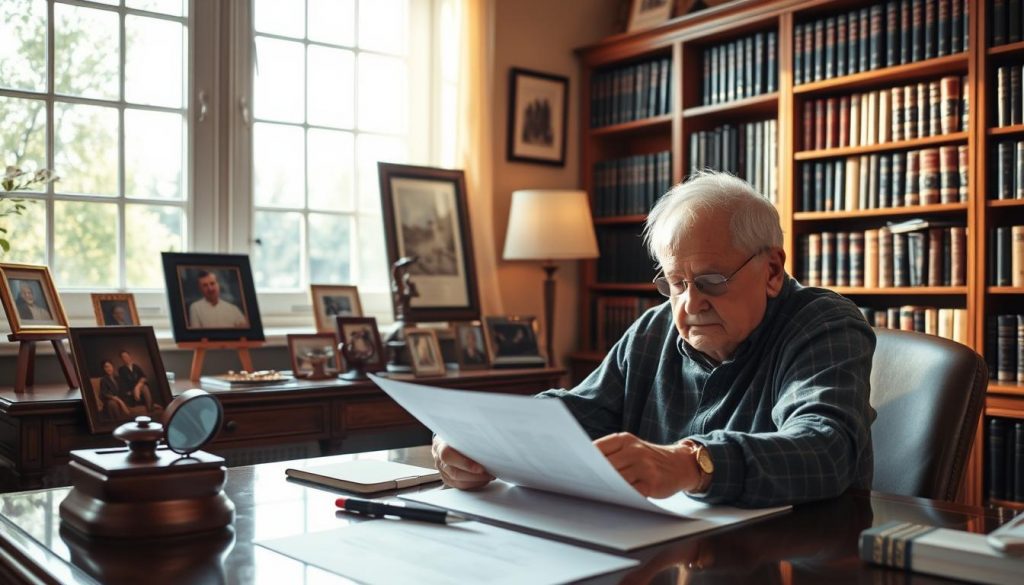When it comes to estate planning, ensuring that your wishes are respected is paramount. Unfortunately, there are instances where individuals may be subjected to coercion or manipulation, potentially altering the distribution of their assets in an unfair manner. At our organisation, we understand the importance of safeguarding against such undue influence to protect your legacy.
Our aim is to provide you with guidance on how to prevent such manipulation and ensure that your will reflects your true intentions. By taking proactive steps, you can secure your estate and provide peace of mind for yourself and your loved ones. For more information on how to protect your will, visit our estate planning services page.
Key Takeaways
- Understand the risks associated with undue influence in estate planning.
- Learn how to identify potential coercion or manipulation.
- Discover steps to safeguard your will and legacy.
- Explore the importance of seeking professional guidance.
- Find out how to ensure your wishes are respected.
Understanding Undue Influence in Will-Making
Undue influence is a significant concern in will-making, as it can lead to unfair outcomes that don’t reflect the testator’s true intentions. When someone creates a will, they expect it to be a genuine reflection of their wishes regarding the distribution of their estate. However, undue influence can compromise this process.
Definition of Undue Influence
According to the American Bar Association, undue influence is defined as “excessive persuasion that causes another person to act or refrain from acting by overcoming that person’s free will and results in inequity.” This means that undue influence occurs when an individual exploits a position of trust or authority to manipulate the testator into making decisions that are not in their best interest.
Such manipulation can be carried out by family members, caregivers, or even professionals involved in the testator’s life. It’s essential to recognize that undue influence can be subtle and may not always be immediately apparent.
Common Signs of Undue Influence
Identifying undue influence can be challenging, but there are certain signs that may indicate its presence. These include:
- Isolation of the testator from friends and family
- Control over the testator’s financial decisions
- Unusual or sudden changes to the will
- A dominant or coercive relationship between the testator and the influencer
Being aware of these signs can help in preventing undue influence and ensuring that the will reflects the testator’s genuine wishes.
Legal Implications
The legal implications of undue influence can be significant. If a will is found to have been made under undue influence, it can be contested and potentially declared invalid by the court. This can lead to lengthy and costly legal battles, causing distress to the family and loved ones of the testator.
To avoid such outcomes, it’s crucial to take proactive steps to prevent undue influence when creating a will. This includes seeking independent legal advice, ensuring the testator’s intentions are clearly documented, and involving trusted witnesses in the process.

The Importance of Will Validity
The validity of a will is paramount in safeguarding the testator’s wishes. Ensuring that your will is valid is crucial for preventing disputes and challenges that may arise after your passing.
Factors Affecting Will Validity
Several factors can affect the validity of a will. These include:
- Undue Influence: The testator must not be under undue influence from another party when making the will.
- Mental Capacity: The testator must have the mental capacity to understand the nature and extent of their estate.
- Proper Execution: The will must be properly executed, signed, and witnessed according to the law.
To ensure that your will is valid, it’s essential to seek legal advice from independent solicitors who can provide guidance on the legal safeguards for will-makers.
Consequences of an Invalid Will
If a will is deemed invalid, it can lead to severe consequences, including:
- Lengthy Legal Battles: Disputes among beneficiaries can result in costly and time-consuming legal proceedings.
- Distribution Contrary to Testator’s Wishes: The estate may be distributed according to the laws of intestacy, potentially contradicting the testator’s intentions.
- Emotional Distress: Family members and loved ones may experience significant emotional distress due to the disputes and uncertainty surrounding the estate.
By understanding the importance of will validity and taking steps to ensure that your will is properly executed, you can protect your legacy and provide peace of mind for your loved ones.
Establishing Testamentary Capacity
When making a will, it’s essential to establish that you have the mental capacity to make informed decisions. This concept is known as testamentary capacity. Ensuring you have testamentary capacity is crucial for preventing potential disputes and ensuring your will reflects your true intentions.
Assessing Mental Competence
Assessing mental competence is a critical step in determining testamentary capacity. It involves evaluating whether you have the cognitive ability to understand the nature of your decisions. This includes:
- Understanding the nature of your assets and their value
- Recognising the people who are likely to benefit from your will
- Comprehending the consequences of your decisions
Mental competence is not just about having a certain level of intelligence; it’s about being able to make informed decisions free from undue influence. Our team can guide you through this process, ensuring that your will is a true reflection of your wishes.

Age and Capacity Considerations
Age-related cognitive decline can significantly impact a person’s ability to make informed decisions. As we age, our mental faculties can diminish, affecting our testamentary capacity. It’s crucial to assess this capacity, especially in older individuals, to prevent potential manipulation or undue influence.
Some key considerations include:
- The individual’s ability to recall important information
- Their understanding of complex decisions
- The presence of any cognitive impairments
By understanding these factors, we can take measures to counter undue influence in will-making, ensuring that your will is valid and reflects your true intentions.
The Role of Independent Legal Advice
Seeking independent legal advice is a crucial step in safeguarding your will against undue influence. When making a will, it’s essential to ensure that your wishes are respected and that you’re not subjected to coercion or manipulation.
Benefits of Independent Solicitors
Independent solicitors provide several benefits when it comes to making a will. They offer unbiased guidance, ensuring that you’re fully aware of your options and the implications of your decisions. An independent solicitor can also help identify potential undue influence and take steps to prevent it.
Some key advantages of working with an independent solicitor include:
- Expert knowledge of estate planning laws and regulations
- Personalized advice tailored to your specific circumstances
- Assistance in identifying and mitigating potential risks
Ensuring a Fair Process
An independent solicitor plays a vital role in ensuring that the will-making process is fair and transparent. They can facilitate open discussions with your family members or potential beneficiaries, helping to prevent misunderstandings and disputes.
| Aspect of Will-Making | Role of Independent Solicitor |
|---|---|
| Testamentary Capacity | Assessing your mental competence to make a will |
| Undue Influence | Identifying and preventing coercion or manipulation |
| Will Drafting | Ensuring your wishes are accurately reflected in the document |
By seeking independent legal advice, you can have peace of mind knowing that your will is valid, fair, and reflects your true intentions.
How to Identify Potential Influencers
The first step in safeguarding a testator’s wishes is to identify potential influencers. Undue influence can manifest in various forms, often subtle and hidden from immediate detection. It is crucial to be aware of the dynamics at play when creating or updating a will.
Recognising Manipulative Behaviour
Manipulative behaviour can be a significant indicator of undue influence. This can include isolation, where an individual isolates the testator from friends, family, or other sources of support, making them more dependent on the influencer. Controlling behaviour is another red flag, where the influencer controls the testator’s interactions, finances, or daily activities.
“Undue influence can be exerted through various means, including coercion, manipulation, or exploitation of a vulnerable individual.” – Source
Other signs include:
- Unusual or sudden changes in the testator’s behaviour or decisions.
- The influencer being overly present or controlling in the testator’s life.
- The testator showing fear, anxiety, or apprehension around the influencer.
Family Dynamics and Their Impact
Family dynamics play a significant role in identifying potential undue influence. Complex family relationships can sometimes lead to manipulation or coercion. It’s essential to understand the testator’s family structure and relationships to identify potential vulnerabilities.
| Family Dynamic | Potential Risk | Mitigation Strategy |
|---|---|---|
| Caregiver Dependency | Caregiver may exert control over testator’s decisions. | Regularly review testator’s decisions with other family members. |
| Family Conflicts | Conflicts may lead to manipulation or coercion. | Encourage open communication and involve neutral third parties. |
| Isolation | Testator may be isolated from other family members or friends. | Ensure regular contact with other family and friends. |
By understanding these dynamics and being vigilant for signs of manipulative behaviour, we can better protect a testator’s wishes from undue influence.

Strategies for Preventing Undue Influence
Ensuring your will is free from undue influence involves several key strategies that we will explore in this section. By understanding and implementing these measures, you can safeguard your legacy and ensure that your wishes are carried out as intended.
Documenting Your Intentions
One effective way to prevent undue influence is by documenting your intentions clearly. This involves writing down your wishes and the reasons behind your decisions. By doing so, you provide a clear record that can help prevent misinterpretation or manipulation.
- Clearly state your wishes and the reasoning behind them.
- Keep the document in a safe and accessible location.
- Ensure that your executors and trusted family members are aware of the document’s existence and location.

Involving Trusted Witnesses
Involving trusted witnesses during the will-making process can provide an additional layer of protection against undue influence. These witnesses can attest that you were not under pressure or coercion when making your decisions.
Benefits of Trusted Witnesses:
- They can provide testimony if your will is contested.
- Their presence can deter potential influencers.
- They can offer support and guidance during the process.
Regularly Reviewing Your Will
Regularly reviewing your will is crucial to ensure it remains valid and reflects your current wishes. Circumstances can change over time, and your will should be updated accordingly.
Consider reviewing your will:
- After significant life events, such as marriage, divorce, or the birth of a child.
- When there are changes in your financial situation.
- Every few years as a routine check to ensure your will remains relevant.
By implementing these strategies, you can significantly reduce the risk of undue influence affecting your will. It’s a proactive approach to ensuring that your legacy is protected and your wishes are respected.
The Role of Professional Executors
Professional executors play a pivotal role in the administration of your estate, providing a safeguard against undue influence. By appointing a professional, you ensure that your estate is managed by someone with the necessary expertise and independence.
Choosing the Right Executor
Selecting an executor is a critical decision that requires careful consideration. You need someone who is not only trustworthy but also capable of managing complex legal and financial matters.
- A professional executor brings objectivity and expertise to the role, reducing the potential for disputes among beneficiaries.
- They are well-versed in estate law and can navigate the complexities of probate, ensuring that your wishes are carried out efficiently.
Their Responsibilities in Will Execution
The executor’s responsibilities are multifaceted, involving both administrative and legal tasks.
| Responsibility | Description |
|---|---|
| Asset Management | Managing and protecting the estate’s assets until distribution. |
| Debt Settlement | Identifying and settling debts, including taxes and other liabilities. |
| Distribution | Distributing the estate according to the instructions in the will. |
By choosing a professional executor, you can ensure that your estate is handled with the utmost care and in accordance with your wishes, providing peace of mind for you and your loved ones.
Legal Recourse Against Undue Influence
Protecting your legacy from undue influence requires knowledge of the legal recourse available. When a will is contested due to suspected undue influence, it can lead to complex and emotionally challenging legal disputes.
Challenging a Will
Challenging a will involves proving that the will does not reflect the true intentions of the deceased due to undue influence. This process can be intricate and requires substantial evidence.
- Gathering evidence of undue influence
- Understanding the legal standards for challenging a will
- Engaging legal professionals experienced in will disputes
Seeking Legal Remedies
If a will is found to be subject to undue influence, the court can provide various remedies. These may include invalidating the will or parts of it, or ordering a new will to be drawn up according to the deceased’s true intentions.
| Legal Remedy | Description | Implications |
|---|---|---|
| Invalidating the Will | The court declares the will null and void due to undue influence. | The estate is distributed according to a previous valid will or intestacy laws. |
| Partial Invalidity | Only parts of the will are deemed invalid due to undue influence. | The remaining parts of the will remain valid, and the estate is distributed accordingly. |
| New Will Ordered | The court orders a new will to be created reflecting the deceased’s true intentions. | The new will supersedes the original, ensuring the estate is distributed as intended by the deceased. |
Understanding the legal recourse against undue influence is crucial for protecting your legacy and ensuring that your wishes are respected. By knowing how to challenge a will and seek legal remedies, you can safeguard against coercion in estate planning.
Case Studies and Examples
The impact of undue influence on a testator’s wishes is starkly illustrated through case studies. By examining real-life scenarios, we can gain a deeper understanding of how undue influence manifests and how it can be prevented.
Notable Cases of Undue Influence
Several high-profile cases have highlighted the issue of undue influence in will-making. For instance, the case of Dowling v. Uriostegui brought to light the complexities involved in determining whether undue influence was exerted over a testator.
In this particular case, the court’s decision underscored the importance of understanding the testator’s mental capacity and the potential for coercion. Such cases serve as a reminder of the need for vigilance in protecting a testator’s wishes.
Key Takeaways from Legal Precedents
Legal precedents provide valuable lessons on undue influence prevention. They highlight the importance of:
- Ensuring the testator has the mental capacity to make informed decisions
- Identifying potential influencers and assessing their impact
- Documenting the testator’s intentions clearly
- Regularly reviewing and updating the will to reflect any changes in circumstances
By learning from these cases, we can better protect testators from undue influence and ensure that their wishes are respected.
Our experience has shown that proactive measures, such as seeking independent legal advice and involving trusted witnesses, can significantly reduce the risk of undue influence. We recommend that individuals take these steps to safeguard their legacy.
Conclusion: Safeguarding Your Legacy
As we have discussed, undue influence can have a significant impact on the validity of a will, potentially jeopardizing one’s legacy. Taking proactive measures to counter undue influence in will-making is crucial to ensuring fairness and autonomy in will creation.
By understanding the signs of undue influence, establishing testamentary capacity, and seeking independent legal advice, individuals can protect their wishes and ensure that their loved ones are provided for. Regularly reviewing and updating one’s will, documenting intentions, and involving trusted witnesses are also essential steps in preventing undue influence.
Proactive Steps for Peace of Mind
Implementing these measures not only safeguards one’s legacy but also provides peace of mind for individuals and their families. By being proactive, individuals can minimize the risk of disputes and ensure that their wishes are respected.
Ensuring a Lasting Legacy
Ultimately, safeguarding one’s legacy requires careful planning, attention to detail, and a commitment to ensuring that one’s wishes are carried out. By following the guidance outlined in this article, individuals can create a lasting legacy that reflects their values and priorities.


